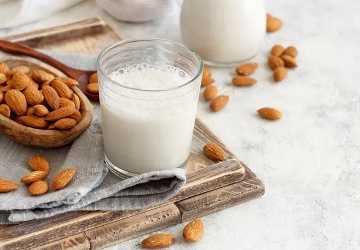What’s Instigating the Popularity of Plant-Based Milk Substitutes?
The rise of plant-based milk alternatives has seen tremendous growth over the past decade. With growing awareness about health, environmental sustainability, and animal welfare, more and more people are leaning towards these alternatives. But what exactly is driving this trend? Let’s explore the ingredients driving the growing plant-based milk trend, popular non-dairy options, and strategies for choosing plant-based milks.
The rise of plant-based milk alternatives has seen tremendous growth over the past decade. With growing awareness about health, environmental sustainability, and animal welfare, more and more people are leaning towards these alternatives. But what exactly is driving this trend? Let’s explore the ingredients driving the growing plant-based milk trend, popular non-dairy options, and strategies for choosing plant-based milks.
Health Benefits of Plant-Based Milks
Nutritional Advantages
Plant-based milk alternatives often offer unique nutritional benefits compared to traditional milk. Some notable benefits include:
- Low in calories and fat: Many popular non-dairy options, such as almond milk and coconut milk, contain fewer calories and fat than cow’s milk.
- Rich in micronutrients: Fortified plant milks provide essential nutrients like vitamin D, calcium, and vitamin B12.
- Rich in antioxidants: Soy and almond milks are known for their high antioxidant content, which relieves oxidative stress.
Lactose Intolerance and Allergies
A large portion of the population suffers from lactose intolerance or milk allergies. For these people, choosing a plant-based milk is essential. Plant-based alternatives are naturally lactose-free, making them suitable for people with milk allergies. This has sparked a plant-based milk trend among health-conscious consumers.

Impact on the Environment
Lower Carbon Footprint
The environmental benefits of choosing plant-based milk are significant. Plant-based milk production requires significantly less water and produces fewer greenhouse gases than cow milk production:
- Lower water usage: Almond milk production uses less water than dairy farming.
- Reduced greenhouse gas emissions: Oat milk and soy milk have a lower carbon footprint than cow milk.
Sustainable Farming Practices
Many popular non-dairy milk suppliers employ sustainable farming practices. For example, crop rotation and organic farming are often used in the production of oat and hemp milks, which helps enhance soil vitality and biodiversity.
Ethical Considerations
Animal Welfare
Animal welfare issues are a key driver of the plant-based milk trend. The dairy industry has been criticized for its animal treatment, which has led consumers to seek cruelty-free alternatives. Plant-based milks offer an ethical choice that aligns with the values of those who care about animal rights.
Vegan and Vegetarian Lifestyles
The rise of veganism and vegetarianism has also increased demand for popular non-dairy milks. Plant-based diets avoid animal products, making plant-based milks an essential ingredient for many vegans and vegetarians. This change is reflected in the growing number of popular non-dairy milks on the market.
Varieties and Flavors
Diverse Choices
One of the fascinating things about choosing a plant-based milk is the wide range of options available. Some common options are:
- Almond milk: Valued for its mild flavor and versatility in the kitchen.
- Soy milk: A protein-rich alternative with a texture very similar to cow's milk.
- Coconut milk: Provides a rich, creamy texture that's perfect for cooking and baking.
- Oat milk: Known for its creamy consistency and mild sweetness.
- Rice milk: A hypoallergenic alternative for those with nut or soy allergies.
Culinary Applications
Plant-based milk is more than just for drinking. It's also commonly used in cooking and baking. Recipes often call for popular non-dairy milks to enhance the flavor and texture of a dish without the need for dairy. This versatility is another reason the plant-based milk trend is growing.
Marketing and Availability
Increasing Availability
The availability of popular non-dairy milks has improved significantly. Supermarkets and health food stores now sell a variety of plant-based milks, making them easier for consumers to find and purchase. The increase in availability has played a vital role in the spread of the plant-based milk trend.
Marketing Efforts
Marketing efforts have also made a significant contribution. Brands have highlighted the health benefits, environmental impact, and ethical aspects of choosing plant-based milks. These campaigns have resonated with consumers seeking healthier, more sustainable options, further increasing the popularity of plant-based milks.
Economic Factors
Cost Parity
Prices of popular non-dairy milks have become more competitive. As demand increases and production expands, prices have become more affordable. Consumers are now more inclined to view plant-based milks as a cost-effective alternative to dairy.
Supporting Local Economies
Some plant-based milk brands are focusing on strengthening the local economy by sourcing ingredients from local farmers. This not only ensures the freshness of the product, but also promotes economic sustainability within the community.
Future Trends
Innovation and Novel Products
The trend for plant-based milks shows no signs of abating. Innovation continues to drive the market forward, with new products and flavors being introduced on a regular basis. Companies are experimenting with ingredients such as pea protein and hemp to create novel, popular non-dairy milks.
Consumer Education
Demand is expected to increase as consumers learn more about the benefits of choosing plant-based milks. Information about the health, environmental, and ethical benefits of plant-based milks is more accessible than ever before, encouraging more people to switch to plant-based milks.

Technological Advancements
Improved Production Methods
Technological innovations are revolutionizing the production of popular non-dairy milks. Major advances include:
- Precision fermentation technology: This technology can produce the same proteins as cow's milk without the use of animals.
- Biotechnological Advances: Genetic engineering and biotechnology are used to improve the nutritional content and palatability of plant-based milks.
- Automated Handling Systems: Automation of the production process improves efficiency and ensures consistent quality.
Sustainable Packaging Solutions
The rise of the plant-based milk trend is also aided by advances in packaging technology. Innovations include:
- Eco-friendly packaging materials: Brands use biodegradable and recyclable packaging materials to reduce environmental impact.
- Smart packaging solutions: Innovative packaging extends shelf life and improves product safety.
- Minimalist design aesthetics: Simple, minimalist packaging designs are popular with eco-friendly consumers.
Integration into the Health and Wellness Industry
Functional Ingredients
Incorporating functional ingredients into popular non-dairy milks increases their appeal. The most important ingredients include:
- Probiotics and prebiotics: Comprehensively promote gut health and digestion.
- Adaptogens: Plant compounds that help the body adapt to stress.
- Superfoods: Contain nutrient-rich ingredients such as spirulina and turmeric to promote health.
Personalized Nutrition
As part of the plant milk trend, the personalized nutrition paradigm is gaining traction. Innovations include:
- Customizable formulations: Consumers can choose plant milks based on their specific nutritional needs and preferences.
- Genome-based recommendations: Advanced testing and analysis provide personalized nutritional recommendations, including the best plant milk options.
Conclusion
The growing popularity of plant milk alternatives is driven by a combination of health benefits, environmental impact, ethical considerations, variety and taste, marketing efforts, economic factors and future trends. The plant milk trend represents a shift in consumer preferences towards healthier, more sustainable and ethically produced products. With the increasing variety of popular non-dairy milks and rising awareness, choosing plant milks is becoming a common choice for many people.





